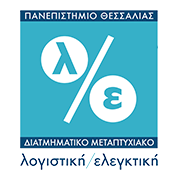Tax Accounting
GENERAL
| SCHOOL | SCHOOL OF ECONOMICS AND BUSINESS | ||||
| SECTION | DEPARTMENT OF ECONOMICS AND DEPARTMENT OF ACCOUNTING & FINANCE | ||||
| LEVEL OF STUDIES | POSTGRADUATE LEVEL | ||||
| COURSE CODE | MSC0206 | SEMESTER OF STUDY | 3 | ||
| COURSE TITLE | TAX ACCOUNTING | ||||
|
INDEPENDENT TEACHING ACTIVITIES |
WEEKLY TEACHING HOURS | CREDIT UNITS | |||
| LECTURES | 3 | 8 | |||
|
TYPE OF COURSE |
REQUIRED |
||||
| PREREQUISITE COURSES: | NO | ||||
| LANGUAGE OF TEACHING AND
EXAMINATION: |
GREEK / ENGLISH | ||||
| THE COURSE IS OFFERED TO ERASMUS STUDENTS | NO | ||||
| ELECTRONIC COURSE PAGE (URL) | https://eclass.uth.gr/ | ||||
| Upon completion of the course the student will be able to:
• Understand the basic concepts of direct and indirect taxation • Understand the usefulness of different taxation methods and the burden on the taxpayer and the benefit to the State • It applies the tax scale, the basic provisions on the taxation of legal persons and the tax provisions on VAT • Accounting treatment of direct and indirect tax events |
| Learning Outcomes |
- LEARNING OUTCOMES
| • Search, analysis and synthesis of data and information, using both the necessary technologies
• Decision-making • Autonomous work • Teamwork • Working in an international environment • Working in an interdisciplinary environment • Generating new research ideas • Respect for the natural environment • Demonstrate social, professional and ethical responsibility • Promoting free, creative and inductive thinking |
| General skills |
| The subject of the course is the analysis of direct and indirect taxation issues and their accounting treatment.
The method of raising tax revenues through both direct and indirect taxation is presented. Such categories of direct taxation that will be analyzed are the income tax of individuals and legal entities, as well as indirect taxation: value added tax (VAT), stamp duties and real estate transfer tax. The accounting monitoring of the above tax issues by the enterprises will be analysed for each tax category. More specifically, during the teaching of the course the following modules will be covered: • Scope of application and taxable persons • Taxable income • Tax rate and income tax reduction • Income from Capital, Dividends, Interest, Royalties and Real Estate and their taxation • Presumptive taxation • Deductible and non-deductible business expenses • Depreciation, Valuation of stocks and semi-finished products, • Bad debts • Indirect method of determining profits • Accounting tracking of withholding and payroll taxes and accounting • Presentation of tax events • Subject and Object of Value Added Tax • |
| • |
|
Delivery of Goods and Provision of Services EU acquisitions and imports • Tax rates and taxable value • VAT accounting monitoring and clearance • Stamp duties • Calculation and payment of transfer tax on first transfer of immovable property |
| • Issues relating to the Property Tax |
- COURSE CONTENT
- TEACHING and LEARNING METHODS – EVALUATION
| METHOD OF DELIVERY | On Site & Distance learning – Hybrid room | |||
| USE OF INFORMATION AND COMMUNICATION TECHNOLOGIES | Use of a hybrid room that includes a large
a wall-mounted screen on which the participants are presented remotely. The connection to the course is made through the Microsoft Teams software, in which a camera is connected to the course. in the room is recorded and illustrated by the teacher. The attendance of the course is also done with the use of the Wacom digital pen, which ensures the interactivity of the lesson with notes that appear directly on the students’ screen. In addition, slides are projected, use of the asynchronous education platform for the posting of course materials, students’ assignments and and communication between lecturers and students, search for electronic journals and resources. |
|||
| ORGANISATION OF TEACHING | Activity | Semester workload | ||
| Lectures | 36 | |||
| Study, preparation and presentation of activities |
146 |
|||
| Study and analysis of the literature
(preparation of lectures & exams) |
55 |
|||
| Final written examination | 3 | |||
| Total Course |
240 |
|||
| STUDENT ASSESSMENT | The assessment is carried out in Greek or in English and is based on the completion of a paper on topical tax issues (20%) and the final written examination (80%) at the end of the semester. | |||
- RECOMMENDED-BIBLIOGRAPHY
| – Suggested Bibliography:
– VAT – Analysis – Interpretation, Dimitris Stamatopoulos – Anna Kloni, FORIN Publications, Athens 2015 – Issues in tax accounting, Demosthenes L. Hevas, Benou G. Publications, 2013, – Revenue Statistics 2015, OECD, 2015 |
| – Grant Thornton, “International Financial Reporting Standards”, Grant Thornton,
3rd edition, 2009 – Hevas, D., Issues in Tax Accounting, 5th Edition, Benou, 2012 – Αnderson, K., Leo, K., Picker, R., Loftus, J., Clark, K. and Wise, V., Applying International Financial Reporting Standards, Wiley, 2009 |
You may also like
Information Systems in Accounting
(1) GENERAL SCHOOL SCHOOL OF ECONOMICS AND BUSINESS SECTION DEPARTMENT OF ECONOMICS AND DEPARTMENT OF ACCOUNTING & FINANCE LEVEL OF STUDIES POSTGRADUATE LEVEL COURSE CODE MSC0207 SEMESTER OF STUDY 3 …
Auditing II
GENERAL SCHOOL SCHOOL OF ECONOMICS AND BUSINESS SECTION DEPARTMENT OF ECONOMICS AND DEPARTMENT OF ACCOUNTING & FINANCE LEVEL OF STUDIES POSTGRADUATE LEVEL COURSE CODE MSC0204 SEMESTER OF STUDY 3 COURSE …
Management Accounting II
GENERAL SCHOOL SCHOOL OF ECONOMICS AND BUSINESS SECTION DEPARTMENT OF ECONOMICS AND DEPARTMENT OF ACCOUNTING & FINANCE LEVEL OF STUDIES POSTGRADUATE STUDY PROGRAMME COURSE CODE MSC0203 SEMESTER OF STUDY 3 …

